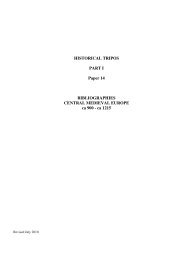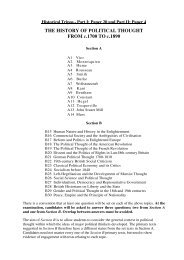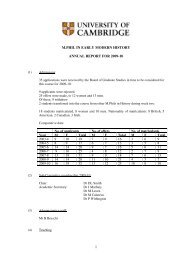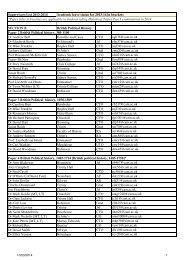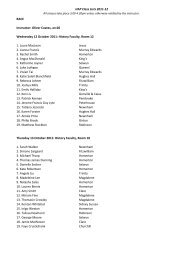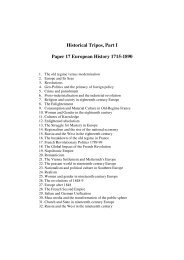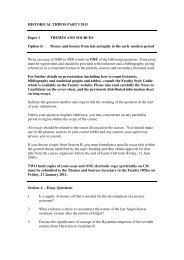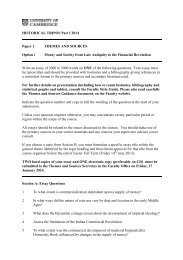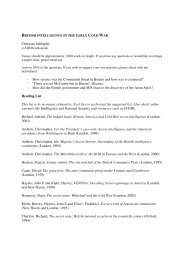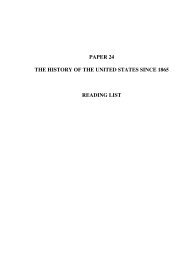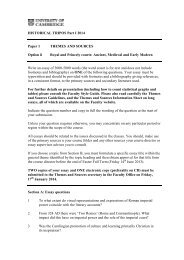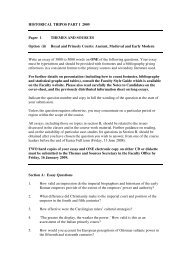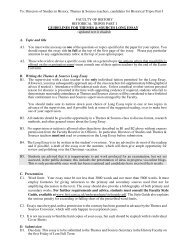Course Handbook - Faculty of History - University of Cambridge
Course Handbook - Faculty of History - University of Cambridge
Course Handbook - Faculty of History - University of Cambridge
Create successful ePaper yourself
Turn your PDF publications into a flip-book with our unique Google optimized e-Paper software.
• Comparative Historical Methods (four sessions, Michaelmas)<br />
o 1. Classics<br />
o 2. Justifications I<br />
o 3. Justifications II<br />
o 4. State <strong>of</strong> the Art<br />
• Introduction to database design and use: Access (three sessions, Lent)<br />
o 1. Introduction to designing a relational database<br />
o 2. Creating tables and queries<br />
o 3. Useful operations<br />
• One other module <strong>of</strong> your choice<br />
Students are advised to check with their supervisors whether it would be advisable to attend<br />
other modules within the Social Science Research Methods <strong>Course</strong> relevant to their<br />
research, and they are encouraged to take as many modules as they wish beyond those<br />
required for the MPhil. For students with no prior training in statistics, it is advisable to<br />
attend the ‘Foundations in Statistics’ module (three sessions, Michaelmas).<br />
Advanced <strong>Course</strong>s in Economic and/or Social <strong>History</strong><br />
Two advanced papers from the following list <strong>of</strong> subjects must be taken over the course <strong>of</strong><br />
Michaelmas and Lent Terms.<br />
1) Topics in the history <strong>of</strong> economic and social thought<br />
2) British industrialization in the eighteenth and nineteenth centuries<br />
3) Institutions and development (taught by the MPhil in Development Studies)<br />
4) International Political Economy since 1945: Bargaining over Ideas and Interests<br />
5) The origins and spread <strong>of</strong> financial capitalism<br />
6) Gender and development<br />
7) Language and society (a course taught by the MPhil in Early Modern <strong>History</strong>)<br />
8) The economic policies <strong>of</strong> right-wing dictatorships in the era <strong>of</strong> mass politics<br />
2.2.3 Part II<br />
Dissertation<br />
The formation and execution <strong>of</strong> the dissertation project on a subject in economic and/or<br />
social history is the largest and most important part <strong>of</strong> the student’s work in the MPhil in<br />
Economic and Social <strong>History</strong>. It is expected that it will account for approximately 60 per<br />
cent <strong>of</strong> the student’s time over the eleven months <strong>of</strong> the course. Candidates are required to<br />
design, research and write up a dissertation on a subject in the fields <strong>of</strong> economic and/or<br />
social history that has been approved by the <strong>Faculty</strong> <strong>of</strong> <strong>History</strong>. The dissertation must be<br />
between 15,000 and 20,000 words in length, exclusive <strong>of</strong> footnotes, references and<br />
bibliography. Candidates must demonstrate that they can present a coherent historical<br />
argument based upon a secure knowledge and understanding <strong>of</strong> primary sources and they<br />
will be expected to place their research findings within the existing historiography <strong>of</strong> the<br />
field within which their subject lies. The dissertation must represent a contribution to<br />
knowledge, considering what may be reasonably expected <strong>of</strong> a capable and diligent student<br />
after eleven months <strong>of</strong> MPhil level study.<br />
Dissertation Titles must be submitted to the MPhil Office by 12 noon on Friday 14<br />
January 2010<br />
Please see Appendix B ‘MPhil in Economic and Social <strong>History</strong> – Marking and Examination<br />
Scheme’ and Appendix C ‘Notes on the Approved Style for MPhil Dissertations’.<br />
5




